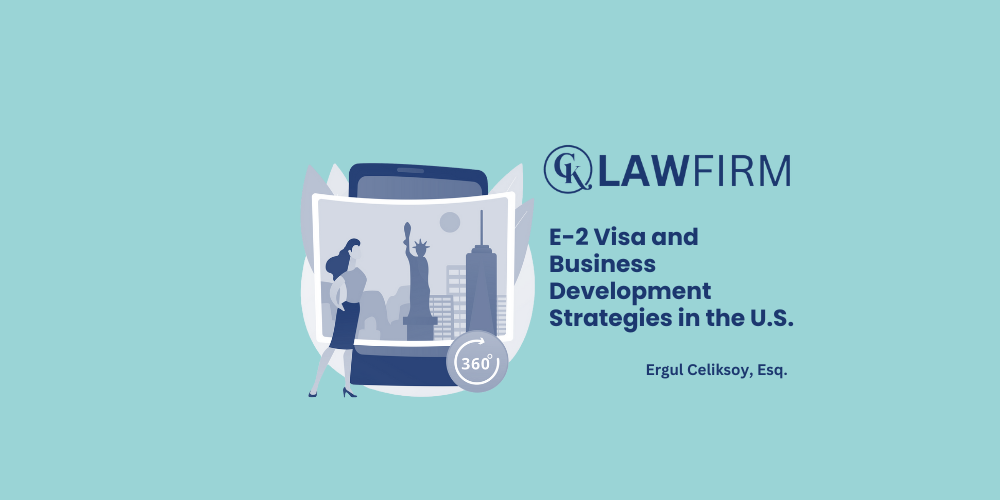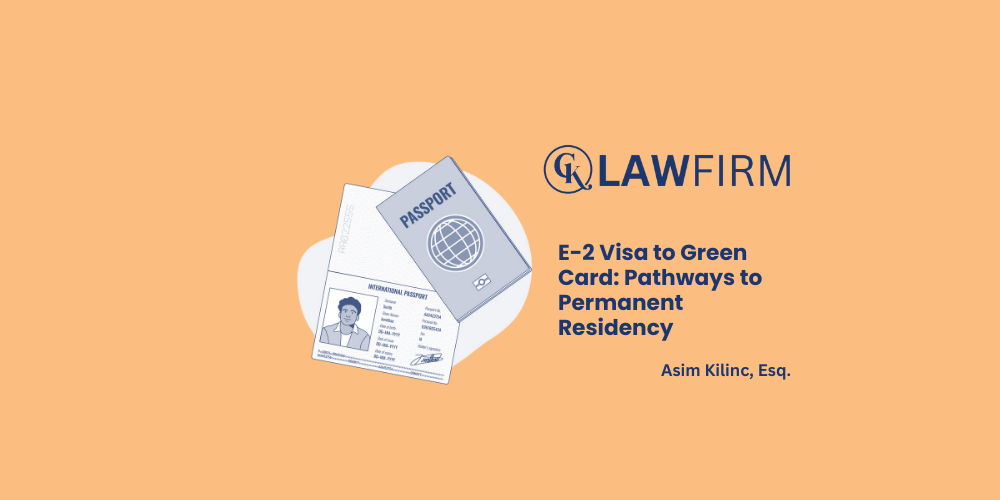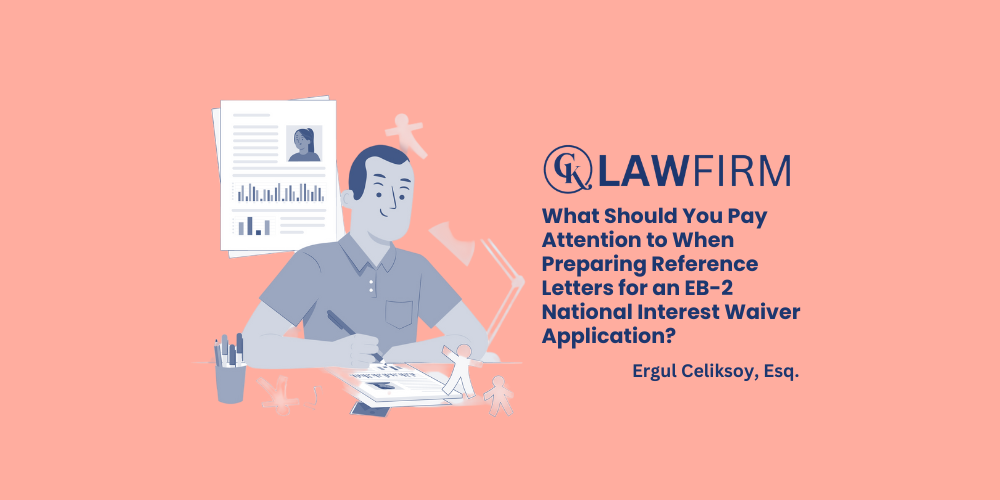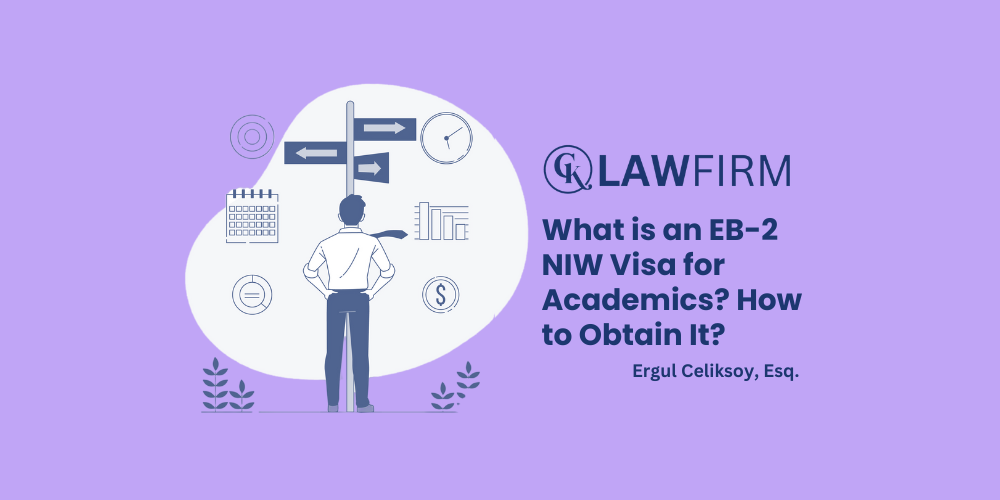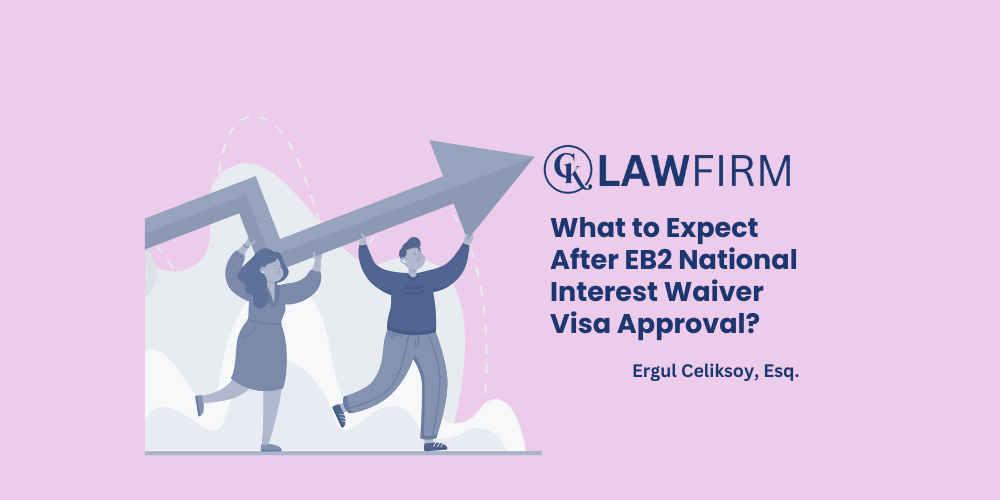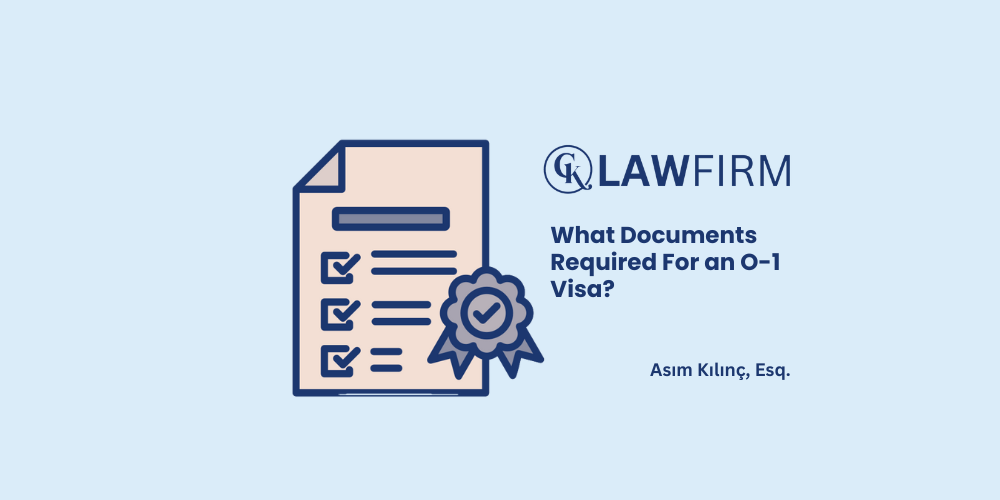Schedule an Appointment with Our Attorneys Now
By Ergul Celiksoy, Immigration Attorney at CK Law Firm
The E-2 visa is a powerful tool that allows investors to establish and manage a business in the United States. However, achieving success under this visa requires the implementation of effective business development strategies. In this article, we detail strategies to help E-2 visa holders grow their businesses and build a successful enterprise in the U.S.:
- Understanding the U.S. Market and Updating Your Business Plan
- Effective Marketing and Brand Management Strategies
- Expanding Your Business and Increasing Your Investment
If you have additional questions about the E-2 visa, feel free to leave a comment below this article, message me directly on LinkedIn, or contact me via the CK Law Firm website.
Understanding the U.S. Market and Updating Your Business Plan
The first step to building a successful business in the U.S. is understanding your target market. The U.S. has a vast and diverse consumer base, and businesses must consider regional and sectoral differences.
Creating a solid business plan is essential for an E-2 visa application, but it should also be updated regularly after the visa is approved. You can follow these steps to improve your business plan:
- Market Research: Analyze the needs, expectations, and purchasing habits of your target customers.
- Competitive Analysis: Identify your competitors and develop strategies to differentiate your business.
- Goal Setting: Define short-, medium-, and long-term goals for your business and take concrete steps to achieve them.
Effective Marketing and Brand Management Strategies
To succeed in the U.S. market, it’s essential to develop a robust marketing and brand management strategy. Combine traditional and digital marketing methods to promote your products and services.
Marketing Strategies:
- Digital Marketing: Leverage social media platforms and tools like Google Ads to reach your target audience effectively.
- Local Advertising: Conduct local ad campaigns to engage customers in your business area.
- Word-of-Mouth Marketing: Enhance customer satisfaction to encourage positive feedback and referrals.
Brand Management:
- Build a strong brand identity to gain customer trust.
- Enhance your business’s credibility with a professional logo and website design.
- Strengthen customer relationships by offering after-sales support.
Remember to comply with U.S. legal regulations during this process. CK Law Firm can assist you in ensuring legal compliance while developing your business strategies.
Expanding Your Business and Increasing Your Investment
Another key aspect of business development under the E-2 visa is increasing your investment and expanding your business. Consider the following strategies to grow your business in the U.S.:
- Opening Branches or New Locations: Expand your customer base by opening new locations.
- Developing New Products or Services: Retain existing customers and attract new ones by broadening your product or service portfolio.
- Seeking Investors or Partnerships: Strengthen your business financially by obtaining support from investors or strategic partners.
Paying close attention to legal regulations and visa requirements is critical during the growth process. Specifically, your business’s financial health and employment policies play a significant role in E-2 visa renewal.
Conclusion
The E-2 visa provides an excellent opportunity to establish and grow a business in the U.S. However, achieving success requires implementing the right strategies and adhering to legal regulations. To grow your business in the U.S., plan every step carefully, from market research to marketing strategies, investment expansion, and legal compliance.
At CK Law Firm, we take pride in offering professional support throughout your journey of establishing and developing a business under the E-2 visa. Contact us to maximize the advantages of your E-2 visa and grow your business.
For professional assistance, detailed information, and consultation services, reach out to us at cklawfirm.org, email us at info@cklawfirm.org, or message us on LinkedIn.
Who is Attorney Ergül Çeliksoy?
Attorney Dr. Ergül Çeliksoy is a founding partner of CK Law Firm and also serves as an Assistant Professor of Law at the University of Nottingham. With extensive experience in U.S. immigration law, Dr. Çeliksoy completed a Master’s degree in international law and human rights law at the University of Nottingham in 2017, followed by a Ph.D. at the same university. His Ph.D., completed in 2022 at the University of Nottingham School of Law, marked a significant milestone in his academic career. Dr. Çeliksoy has published extensively in leading academic journals and is internationally recognized for his expertise in modern slavery, criminal justice, and criminal law. As a member of the California Bar, Dr. Çeliksoy offers exceptional service to his clients, particularly in U.S. immigration law cases. His expertise and experience in immigration law significantly contribute to CK Law Firm’s work in this area.
Dr. Çeliksoy provides comprehensive and strategic solutions to his clients in immigration law cases, helping secure their legal status in the U.S. His work on human rights and immigration processes, particularly in modern slavery and criminal law, effectively addresses the complex legal issues immigrants face. Dr. Çeliksoy reinforces CK Law Firm’s leadership in immigration law by offering reliable and effective legal consulting services to his clients, helping them build new lives in the United States.
By Asim Kilinc, Immigration Attorney at CK Law Firm
The E-2 visa is an attractive option for individuals looking to invest and establish a business in the U.S. However, it does not directly provide a pathway to a Green Card. Nevertheless, E-2 visa holders can pursue specific strategies to obtain permanent residency. This article outlines the main routes from an E-2 visa to a Green Card in detail:
- Why the E-2 Visa Does Not Directly Lead to a Green Card
- Transitioning to a Green Card via the EB-5 Investor Visa
- Employer-Sponsored Green Cards (EB-1 or EB-2 Categories)
- Family-Based Green Card Applications
If you have additional questions, feel free to leave a comment below this article, message me directly on LinkedIn, or reach out via the CK Law Firm website!
Why the E-2 Visa Does Not Directly Lead to a Green Card
The E-2 visa is a temporary, non-immigrant visa available only to citizens of certain treaty countries. While it allows the holder to establish a business in the U.S., it does not provide permanent residency. E-2 visa holders can renew their status and expand their business, but the visa itself does not automatically transition to a Green Card.
Despite this limitation, E-2 visa holders may qualify for a Green Card by pursuing other immigrant visa categories. For instance, increasing their investment to meet EB-5 requirements or applying for an employer-sponsored Green Card under the EB-1 or EB-2 categories are effective strategies.
Transitioning to a Green Card via the EB-5 Investor Visa
The EB-5 visa is the most direct route for investors to obtain a Green Card. E-2 visa holders can expand their businesses or make new investments to meet EB-5 criteria. Generally, the EB-5 program requires a minimum investment of $1,000,000 (or $800,000 in targeted employment areas) and the creation of at least 10 jobs for U.S. workers.
Advantages of Transitioning from E-2 to EB-5:
- Already having an established business in the U.S. may streamline the EB-5 process.
- Expanding your E-2 business model can help meet EB-5 requirements.
- Achieving the required investment threshold can lead to permanent residency.
Employer-Sponsored Green Cards (EB-1 or EB-2 Categories)
E-2 visa holders may apply for a Green Card through employer sponsorship. The EB-1 (Extraordinary Ability) and EB-2 (Advanced Degree or National Interest Waiver) categories are common choices for employer-sponsored applications.
Eligibility Requirements for EB-1 and EB-2 Categories:
- EB-1: Demonstrated extraordinary abilities or international recognition in your field.
- EB-2: Possess an advanced degree or have exceptional abilities contributing significantly to the U.S. economy.
E-2 visa holders cannot self-sponsor within their own business but can apply through another employer or via the National Interest Waiver (NIW) pathway.
Family-Based Green Card Applications
E-2 visa holders can also apply for a Green Card through family sponsorship. Marriage, children, or parents who are U.S. citizens or Green Card holders can expedite this process.
Examples of Family-Based Applications:
- Marriage to a U.S. citizen or Green Card holder.
- Sponsorship by a U.S. citizen child or parent.
Conclusion
While obtaining a Green Card as an E-2 visa holder requires careful planning, it is achievable through options like the EB-5 Investor Visa, employer sponsorship, or family-based applications. At CK Law Firm, we are here to guide you through every step of this journey. Contact us at cklawfirm.org, email us at info@cklawfirm.org, or message us on LinkedIn for professional assistance and detailed advice.
Who is Attorney Asım Kılınç?
Attorney Asım Kılınç is the co-founder of CK Law Firm and is recognized for his expertise in immigration law and U.S. asylum applications. Kılınç completed his Master’s degree at Southern Methodist University Dedman School of Law and is a member of the Missouri Bar Association, with a focus on U.S. immigration law.
Attorney Kılınç’s extensive knowledge and experience in immigration law have significantly contributed to CK Law Firm’s success in this field. He has actively participated in the preparation of over 1,000 cases, demonstrating his expertise in this area. By providing comprehensive and professional legal support to his clients, he helps them adapt to their new lives in the U.S.
Attorney Kılınç is also well-versed in U.S. asylum applications. He meticulously guides his clients through the process and ensures they receive the best legal advice. He provides top-quality service to clients in matters of citizenship, Green Card, work permits, and other immigration processes, supporting them from start to finish on their journey to U.S. citizenship.
Attorney Asım Kılınç, who solidifies CK Law Firm’s leadership in immigration law and U.S. asylum applications, offers reliable and effective legal consultancy services to clients, assisting them in building a new life in the U.S.
By Ergul Celiksoy, Immigration Attorney at CK Law Firm
The EB-2 National Interest Waiver (NIW) visa is a prestigious type of visa that allows professionals to work and live in the United States. When applying for this visa, it is crucial to support your eligibility with statements from your colleagues. Therefore, I always emphasize the importance of supporting my clients’ EB-2 NIW application files with strong reference letters. Presenting strong reference letters plays a critical role in the success of your application. In this article, you will find answers to the most frequently asked questions based on the many EB-2 NIW applications I have prepared for my clients.
Here are the questions you will find answers to regarding the reference letters for the EB-2 NIW application:
- How should the reference letters be prepared?
- From whom should the reference letters be obtained?
- What should be considered when preparing the reference letters?
Now, let’s provide comprehensive answers to these questions one by one.
How Should the Reference Letters for an EB-2 NIW Application Be Prepared?
When preparing your reference letters, they should generally consist of 5 sections:
- Introduce the Applicant: The letter should start by introducing the applicant. The reference provider should clearly state who the applicant is, what field they work in, and the nature of their contributions.
- Specify the Reference Provider’s Identity and Expertise: The reference provider should state their own identity, position, and area of expertise. This increases the reliability and value of the reference.
- Highlight the Applicant’s Contributions and Achievements: The letter should detail the applicant’s contributions to the field, projects, and achievements, especially emphasizing national and international successes.
- Be Unique and Personalized: The letter should be unique and personalized for the applicant, avoiding general statements and providing specific examples. This makes the letter more convincing.
- State the Importance for the U.S.: Explain why the applicant is important for the U.S. and how they will contribute to national interests. This is a requirement of the EB-2 NIW visa.
From Whom Should the Reference Letters for an EB-2 NIW Application Be Obtained?
Getting reference letters from the right people for your USCIS application file is as important as the content of the letters. For instance, a reference letter from someone unrelated to your field and professional qualifications will not be beneficial to your file. Therefore, when asking yourself, “From whom can I get reference letters for my file?” ensure that these individuals meet the following 3 criteria:
- Recognized Experts in the Field: The letters should be from recognized and reputable experts in the applicant’s field. These individuals can better evaluate the applicant’s competence and achievements.
- Academic and Professional Superiors: Letters from academic or professional superiors who have directly worked with the applicant are highly valuable as they have directly observed the applicant’s projects and work ethic.
- International Collaborators: Letters from international collaborators with whom the applicant has worked on projects can highlight the applicant’s international impact.
What Should Be Considered When Preparing Reference Letters for an EB-2 NIW Application?
In my clients’ applications and in successful EB-2 NIW cases I have reviewed, I have noticed that the reference letters meet the following criteria:
- Credibility and Reputation: The credibility and reputation of the reference providers are important. Letters from recognized and reputable individuals make the application stronger.
- Detail and Specificity: The letters should be detailed and specific, avoiding general statements and supporting the applicant’s achievements with concrete examples.
- Consistency: There should be consistency among the different reference letters. The reference providers should have similar views about the applicant’s competencies and achievements, enhancing the application’s credibility.
- Language and Style: The letters should be written in a professional language and style, avoiding grammar and spelling mistakes and using fluent language.
Conclusion
Reference letters for the EB-2 NIW visa are one of the most critical components of the application. Preparing strong and convincing reference letters greatly affects the success of the application. Therefore, reference letters should be prepared carefully and obtained from credible and reputable individuals. It is recommended to seek professional support at every stage of the application to manage the process more effectively. If you wish, we can manage the entire process for you, leaving you to plan your dreams in the USA. You can find out if you qualify for EB-2 NIW with our free consultation service by contacting us through cklawfirm.org, emailing info@cklawfirm.org, or reaching out directly on LinkedIn. All you need to do is send us your CV. We will review your CV and get back to you within 24 hours.
Who is Attorney Dr. Ergül Çeliksoy?
Attorney Dr. Ergül Çeliksoy is a co-founder of CK Law Firm. Dr. Çeliksoy has extensive experience in U.S. immigration law. He completed his master’s degree in international law and human rights at the University of Nottingham in 2017 and began his doctoral studies at the same university. Dr. Çeliksoy completed his Ph.D. in law at the University of Nottingham School of Law in 2022, crowning his academic career. Dr. Çeliksoy has published in leading academic journals and is internationally recognized for his expertise in modern slavery, criminal justice, and criminal law. A registered member of the California Bar, Dr. Çeliksoy provides superior service to his clients with his deep knowledge and experience in U.S. immigration law cases. His knowledge and experience in immigration law contribute valuable insights to CK Law Firm’s work in this area.
Dr. Çeliksoy offers comprehensive and strategic solutions to his clients in immigration law cases, helping them secure their legal status in the United States. His work in human rights and immigration processes, along with his deep knowledge of modern slavery and criminal law, allows Dr. Çeliksoy to effectively resolve the complex legal issues faced by immigrants. Dr. Çeliksoy strengthens CK Law Firm’s leadership in immigration law by providing reliable and effective legal counsel, helping his clients build their new lives in the United States.
By Ergul Celiksoy, Immigration Attorney at CK Law Firm
Individuals who have built a career in academia can take advantage of the opportunity to live and work in the United States through the EB-2 NIW visa. This way, they can obtain residence and work permits in the US for themselves, their spouses, and their children under 21. Commonly referred to as the “academic visa,” this visa allows you to get a permanent residence permit (green card) and move to the US, and you can become a citizen after five years. By reading this article, you will find answers to the following questions:
- What is the educational level required for academics to apply for the EB-2 NIW visa?
- What documents do academics need to submit for the EB-2 NIW application?
The EB-2 NIW visa is a type of visa that allows professionals with an academic career (such as faculty members, professors, associate professors, assistant professors, etc.) to apply without needing a job offer or sponsorship from a US employer if they intend to work in the US.
What is the educational level required for individuals with an academic career to apply for the EB-2 NIW?
The primary requirement to apply for the EB-2 NIW visa is an advanced degree, meaning:
- A master’s or doctoral degree in your field, or
- A bachelor’s degree plus five years of experience.
Meeting the advanced degree requirement necessitates a high level of education in the professional field, and the applicant must possess this level. The clearest indicator of meeting this criterion is having a master’s or doctoral degree in the field.
Individuals who do not have a master’s or doctoral degree but have a bachelor’s degree in the field and have worked in a significant position in the field for at least five years are also considered to meet this requirement. However, in this case, solid evidence of work experience in the field (various educational certificates, achievements in the field, academic publications, etc.) must be included in the application letter. Clear evidence showing that the applicant will benefit national employment in the field, has contributed to significant projects, and has achieved professional success will also be considered.
What documents do academics need to submit for the EB-2 NIW application?
When applying for the EB-2 NIW visa as an academic, the following documents can support your application:
- Publications: Publications in national and international academic journals. Being a sole or first author is advantageous.
- Citations: Citations to your publications, visible on Google Scholar. While there is no ideal number, the more, the better.
- Research Activities, Funding, and Academic Project Participation: Participation in any project related to your field of expertise. For example, receiving support from TÜBİTAK or BAP from universities. Even without financial support, participating in or supporting projects related to the field is advantageous.
- Conference Participation and Presentations: Academic presentations, either summaries or full texts, related to your field of expertise.
- Journal Editorship, Peer Reviews, and Jury Duties: Serving as an editor, assistant editor, or member of the scientific board in academic journals, peer reviews, and jury duties for master’s or doctoral theses provide significant advantages.
- Certificates: Certificates of education related to the field, including online education.
- Awards, Achievements, and Acknowledgments: Certificates received during and after undergraduate studies, especially in professional life (optional but advantageous).
- Work History: Places and positions worked in the field of expertise to date. If you have had additional duties (such as working as an administrator while being a doctor, or serving on a committee while being an academic), these can also be included to strengthen the application.
- Memberships: Memberships in professional associations/institutions related to your field of expertise. Memberships are sometimes annual, so they can be obtained close to the application time. For example, the Istanbul Medical Chamber for doctors or the American Association of Orthodontists for orthodontists.
- Media Appearances: Appearances in local, national, or international news channels/newspapers/websites related to your field of expertise. In this case, your expert opinion or work related to any issue in your field should be highlighted. This criterion is rarely met by applicants and is not mandatory but provides a significant advantage.
The EB-2 NIW visa offers individuals with an academic career the opportunity to live and work permanently in the USA. The required documents and evidence for this visa type must be carefully prepared, and professional support should be obtained at every stage of the application process. We can manage the entire process for you, leaving you to plan your dreams in the USA. You can find out if you qualify for EB-2 NIW with our free consultation service by contacting us through cklawfirm.org, emailing info@cklawfirm.org, or reaching out directly on LinkedIn. All you need to do is send us your CV. We will review your CV and get back to you within 24 hours.
Who is Attorney Dr. Ergül Çeliksoy?
Attorney Dr. Ergül Çeliksoy is a co-founder of CK Law Firm. Dr. Çeliksoy has extensive experience in U.S. immigration law. He completed his master’s degree in international law and human rights at the University of Nottingham in 2017 and began his doctoral studies at the same university. Dr. Çeliksoy completed his Ph.D. in law at the University of Nottingham School of Law in 2022, crowning his academic career. Dr. Çeliksoy has published in leading academic journals and is internationally recognized for his expertise in modern slavery, criminal justice, and criminal law. A registered member of the California Bar, Dr. Çeliksoy provides superior service to his clients with his deep knowledge and experience in U.S. immigration law cases. His knowledge and experience in immigration law contribute valuable insights to CK Law Firm’s work in this area.
Dr. Çeliksoy offers comprehensive and strategic solutions to his clients in immigration law cases, helping them secure their legal status in the United States. His work in human rights and immigration processes, along with his deep knowledge of modern slavery and criminal law, allows Dr. Çeliksoy to effectively resolve the complex legal issues faced by immigrants. Dr. Çeliksoy strengthens CK Law Firm’s leadership in immigration law by providing reliable and effective legal counsel, helping his clients build their new lives in the United States.
By Ergul Celiksoy, Immigration Attorney at CK Law Firm
In this article, we continue to look at the details of the EB2 National Interest Waiver visa. You can find our detailed article on the conditions of the EB2 NIW visa, who can apply and what is the application process here. You can find our article on the application process of the EU2 NIW visa and how long it takes for the application to be approved here.
In this article, I will explain what kind of process awaits you after your EB2 National Interest Waiver visa application is approved.
As I explained in detail in our previous articles, you need to submit your EB2 NIW visa application to the Immigration Office in the US. You must submit this application by mail and your application package should include your application, the relevant forms and the application fees. If you use Premium Processing, your application will be processed within 45 days. If you do not use Premium Processing but submit a standard application, your application will be processed within 3 to 9 months.
What Happens After Your EB2 NIW Application is Approved?
Let’s say that at the end of this process, the Immigration Bureau has reviewed your application and determined that you meet the EB2 NIW visa criteria, thus approving your application. Congratulations, the doors to America are now open for you. With your EB2 NIW visa approved, you are very close to realizing your American dream. While the process from here is somewhat longer, it will be much less arduous. Let’s see what awaits you after approval.
Approval Notice
Once your initial application is received and processed by the Immigration Bureau, you will receive a Receipt Notice. This Receipt Notice has a Receipt Number, which you can use to check the status of your application on the USCIS Case Status website. When your application is approved, it will state “Case Approved,” and this approval will be recorded in the system by the Immigration Bureau.
Following this, the Immigration Bureau will send you an Approval Notice. This Approval Notice will also include the dates when your application was first submitted and approved, along with your Priority Date. This Priority Date is crucial for understanding how the process will proceed from here.
What is the Priority Date and What Does It Mean?
First, you should check the Priority Date on your Approval Notice. Then, you need to check the Visa Bulletin published each month. You can access the latest Visa Bulletin on the State Department’s website.
The Visa Bulletin categorically lists when the earliest Green Card applications can be made for different visa types. This means that for some visa types, if there are more Green Card approvals than the number allocated for that year, the surplus is carried over to the next year. In this way, for some visa types, there may be a backlog due to the current number of available Green Cards being exceeded by the number of visa approvals. Therefore, Green Card applications are made considering the Priority Date I mentioned earlier.
What you need to do: First, check your Priority Date. Your Priority Date is listed in the Approval Notice sent to you after your visa is approved. Then, go to the latest Visa Bulletin to check when you can apply for a Green Card for the EB2 NIW visa. For this, go to the Employment-Based Preferences chart in the Visa Bulletin and look at the second row. This row shows the earliest date when those with a Priority Date for the EB2 NIW visa can apply for a Green Card.
According to the August 2024 Visa Bulletin, it says March 15, 2023. Here’s what this date means: If your Priority Date is before this date, you can apply for a Green Card immediately without waiting. If your Priority Date is later, say November 2023, you need to check the Visa Bulletin every month and wait for the date in the Visa Bulletin to be after your Priority Date.
This part is often confusing, so I will try to explain with an example. Let’s say your EB2 NIW visa application was received and processed by the Immigration Bureau on September 1, 2023. This date is your Receipt Date. This is the date your file was processed. The Immigration Bureau usually sets the date your application was processed as your Priority Date. However, you should always check the Receipt Notice sent to you and consider the Priority Date stated there. Let’s say the Priority Date on the Receipt Notice sent to you is September 1, 2023. Later, the Immigration Bureau reviewed your application and approved it on January 1, 2024. Now, to apply for a Green Card based on your EB2 NIW visa approval, you should consider your Priority Date, which in this case is September 1, 2023, not your approval date of January 1, 2024.
Next, you need to look at the Visa Bulletin and compare the date in the Visa Bulletin for the EB2 NIW visa with your Priority Date. According to the latest Visa Bulletin for August 2024, the date for the EB2 NIW visa is March 15, 2023. Your Priority Date is September 1, 2023. Since your Priority Date is after the date in the Visa Bulletin, you cannot apply for a Green Card right now. However, when the date in the Visa Bulletin is later than your Priority Date, you can apply for a Green Card. For example, if the date in the Visa Bulletin were November 15, 2023, instead of March 15, 2023, you could apply for a Green Card without waiting because November 15, 2023, is later than your Priority Date of September 1, 2023.
Situation for Those Following the EB2 NIW Process from the US
If your Priority Date is earlier than the date in the Visa Bulletin, you can now start your Green Card process. How will the process work? It depends on whether you are following the process from the US or Turkey.
If you are following the process from the US, it is a bit simpler. You need to file for Adjustment of Status (Form I-485). In other words, you are applying for a Green Card. For this, you need to carefully and completely fill out Form I-485. Additionally, you need to include some documents with this application, such as copies of your passport, visa, I-94, etc. You also need to include the Approval Notice showing that your EB2 NIW visa has been approved. You should also include other documents that will support your Green Card application.
When filing for Adjustment of Status with Form I-485, you can also submit two additional application forms. The first is Form I-765. With Form I-765, you are applying for a work permit in the US while waiting for your Green Card application to be approved. It is not mandatory, but if you do not have another work permit, I recommend submitting Form I-765 along with Form I-485.
You can also include Form I-131 with your I-485 application. Again, it is not mandatory, but with Form I-131, you are applying for a Travel Document. If your Green Card approval is significantly delayed and you need to travel outside the US during this time, this Travel Document will allow you to travel.
The EB2 NIW Process for Those Following from Turkey
What awaits you after approval if you are following the process from Turkey? For those following the process from Turkey, the process is slightly different. First, those who are not physically and legally present in the US cannot file for Adjustment of Status with Form I-485.
If you are following the process from Turkey, once your EB2 NIW visa is approved, your file is transferred to an institution called the National Visa Center. After your file is approved, the Immigration Office (USCIS) automatically sends your file to the National Visa Center. You do not need to do anything for this.
After your file reaches the National Visa Center, you will wait for the National Visa Center to contact you via email. Usually, within 1.5 to 2 months, the National Visa Center will send you an email. This email will include a document. This document informs you that the National Visa Center now has your file and explains what you need to do next.
The document from the National Visa Center will also give you a Case Number. From now on, your application will be tracked using this Case Number provided by the National Visa Center.
Additionally, the National Visa Center expects you to do three things at this stage. The first is to pay the immigration visa processing fee. The current fee is $345 per person. If you have your spouse and children included in your application, you will need to pay $345 for each person.
The second thing the National Visa Center expects from you is to mail the requested documents to the National Visa Center. The requested documents usually include your passport, visa, birth certificates, marriage and divorce certificates, if any, court files, criminal records, military documents, documents proving your income source, and deeds and licenses related to your assets, etc. You need to send these documents to the National Visa Center after paying the $345 fee.
After sending your documents, the National Visa Center will review them. If any documents are missing, they will contact you again. If your documents are complete or once they are complete, the National Visa Center will send you an email to inform you that your documents have been approved. Reviewing and approving these documents usually takes about 2 months.
Once your documents are approved by the National Visa Center, the only thing left to do is to schedule a visa appointment with the consulate. Once you are given an appointment date, this visa date will be communicated to you and your attorney. All that is left is to wait for this visa date and attend the visa interview.
Conclusion
The EB2 NIW process is quite complex and involves many details and procedures that need to be followed. Although it is a long process, the process after the EB2 NIW visa is approved is relatively easy.
If you are curious about whether you meet the necessary requirements for the EB2 NIW visa, you can send us an up-to-date and detailed CV. We will conduct a free evaluation for this visa as soon as possible and get back to you via email. If our initial review indicates that you are suitable for this visa, we will conduct a free 30-minute Zoom interview with you to make a more detailed assessment.
Who is Attorney Dr. Ergül Çeliksoy?
Attorney Dr. Ergül Çeliksoy is the co-founder of CK Law Firm. Dr. Çeliksoy has extensive experience in US immigration law. He completed his master’s degree in international law and human rights law at the University of Nottingham in 2017 and began his doctoral studies at the same university. Dr. Çeliksoy crowned his academic career by completing his Ph.D. in law at the University of Nottingham School of Law in 2022. Dr. Çeliksoy has published in leading academic journals and is internationally recognized for his expertise in modern slavery, criminal justice, and criminal law. Dr. Çeliksoy, a registered member of the California Bar, provides superior service to his clients with his deep knowledge and experience in US immigration law cases. His knowledge and experience in immigration law add valuable contributions to CK Law Firm’s work in this field.
Dr. Çeliksoy offers comprehensive and strategic solutions to his clients in immigration law cases, helping them secure their legal status in the United States. His studies on human rights and immigration processes, and his deep knowledge of modern slavery and criminal law allow Dr. Çeliksoy to effectively solve the complex legal problems faced by immigrants. Dr. Çeliksoy strengthens CK Law Firm’s leadership in immigration law by providing reliable and effective legal advice, helping his clients build their new lives in the United States.
Asım Kılınç, Immigration Attorney, CK Law Firm
The O-1 visa, designed for individuals with extraordinary abilities, is also available for professionals in fields such as arts, science, education, business, and sports. So, what documents required for an O-1 visa, and how can you manage this process? In this article, I will address these questions and explore the following topics about the U.S. O-1 visa:
- What is the O-1 Visa, and Who is Eligible?
- Documents Required to Obtain an O-1 Visa
- The O-1 Visa Application Process
- Frequently Asked Questions About the O-1 Visa
If you have questions beyond these topics, feel free to reach out through the comments section of this blog or via the CK Law Firm official website. For personalized inquiries or consultancy services, you can also connect with me directly on LinkedIn.
What is the O-1 Visa, and Who is Eligible?
The O-1 visa allows individuals with extraordinary abilities to work and reside in the United States. With this visa, you can obtain temporary authorization to work and reside in the United States. Professionals who have demonstrated exceptional achievements in their fields—such as artists, academics, athletes, and scientists—are eligible to apply for an O-1 visa.
The O-1 visa allows individuals to elevate their careers and talents to an international level. This extraordinary ability visa enables qualified professionals to work in the U.S. temporarily. Furthermore, O-1 visa holders can also apply for a Green Card, transitioning their temporary status into permanent residency for long-term work and living opportunities in the United States.
Differences Between O-1A and O-1B Visas
The O-1 visa categorizes applicants into two groups, allowing them to apply based on their specific field of expertise. The differences between these two categories are as follows:
- O-1A Visa: Designed for individuals with extraordinary abilities in science, education, business, and sports.
- O-1B Visa: Suitable for those with extraordinary abilities in the fields of arts and media.
Documents Required to Obtain an O-1 Visa
Applicants for the O-1 visa must prepare a comprehensive list of documents. Ensuring that these documents are complete and accurate is crucial for a successful application. Below are the essential documents required for an O-1 visa application:
- Passport: A valid passport covering the duration of your stay in the United States.
- Form I-129: A petition that must be submitted by your employer to U.S. Citizenship and Immigration Services (USCIS).
- Form DS-160: An online application form required for submission to the U.S. consulate.
Applicants must prepare these fundamental documents for the O-1 visa application process. Additionally, you must provide documents related to your professional background, including:
- Supporting Documents:
- Resume: An updated CV detailing your professional achievements and career milestones.
- Awards and Certifications: Documents showcasing your skills and accomplishments in your field.
- Publications and Media Evidence: Examples of your scientific papers, artistic works, or media features.
- Job Offer Letter: An official job offer from your U.S. employer.
- Reference Letters: Letters from prominent individuals in your field highlighting your extraordinary abilities.
You will also need to provide financial evidence to support your O-1 visa application, including:
- Proof of Financial Stability: Bank statements demonstrating that you have sufficient funds to support yourself during your stay in the United States.
- Employer’s Financial Capability: Documentation proving that your employer has the financial capacity to pay your salary.
The O-1 Visa Application Process
While the O-1 visa application process may seem challenging or overwhelming, taking the right steps and being well-prepared can lead to a successful outcome. The more organized you are, the smoother the process will be. Here are the steps to apply for a U.S. O-1 visa:
- Preparation and Submission of the Petition: Your employer must complete and submit Form I-129 to USCIS along with supporting documents such as awards, reference letters, and job offers. These documents should provide sufficient evidence of your extraordinary abilities. Ensuring that the application is complete and submitted on time is critical for faster processing.
- USCIS Approval: USCIS reviews the petition and evaluates whether you meet the legal criteria for the visa. Once approved, you can proceed to the next stage of the application process.
- Consulate Application: For those applying from outside the U.S., you must schedule an appointment at the nearest U.S. consulate for an interview. During the interview, your documents and the purpose of your visit will be thoroughly reviewed.
- Visa Issuance: After your documents are verified and the interview is successfully completed, your visa will be approved. Once it is stamped into your passport, you can travel to the United States.
Tips for a Successful O-1 Visa Application
To ensure a successful O-1 visa application, it’s important to focus on key aspects that have proven effective based on the experiences of previous applicants. Here are some essential tips:
- Prepare Comprehensive Documentation: Ensure your documents are up-to-date, accurate, and professionally presented. Pay special attention to your resume, awards, and certifications, making sure they are complete and clearly showcase your achievements.
- Obtain References from Leaders in Your Field: Letters of recommendation from prominent figures in your field significantly enhance your application’s credibility. These letters should highlight your accomplishments and potential contributions to the U.S. in your area of expertise.
- Secure Strong Employer Support: A detailed petition from your employer can provide a significant advantage. The petition should explain how your role will contribute to the U.S. economy or culture and include specific details about the importance of your work.
- Strengthen Your Supporting Documents: Evidence such as publications, media articles, or international awards plays a critical role in demonstrating your extraordinary abilities. Ensure these documents are translated into English and officially certified if required.
- Consider Premium Processing: Opt for premium processing to expedite your application. This option is particularly beneficial when time is limited, offering faster results for urgent cases.
Frequently Asked Questions About the O-1 Visa
I’m sharing answers to some of the most frequently asked questions that applicants often wonder about and that I commonly hear:
- How Long Does It Take to Obtain an O-1 Visa?
The application process typically takes 2-3 months. However, with the premium processing option, this timeline can be reduced to as little as 15 days. Delays may occur if there are missing documents or if additional review is required. Therefore, ensuring that your documents are accurate and complete is critical.
- Does the O-1 Visa Cover My Family?
Yes, your spouse and children under the age of 21 are eligible for the O-3 visa, allowing them to accompany you to the United States. O-3 visa holders can pursue education but are not authorized to work.
In this article, I’ve covered the necessary documents for an O-1 visa application and key points to consider. If you have any additional questions or concerns, feel free to reach out through the comments section of this blog or via our website. You can also contact me directly on LinkedIn for inquiries or information about my consultation services.
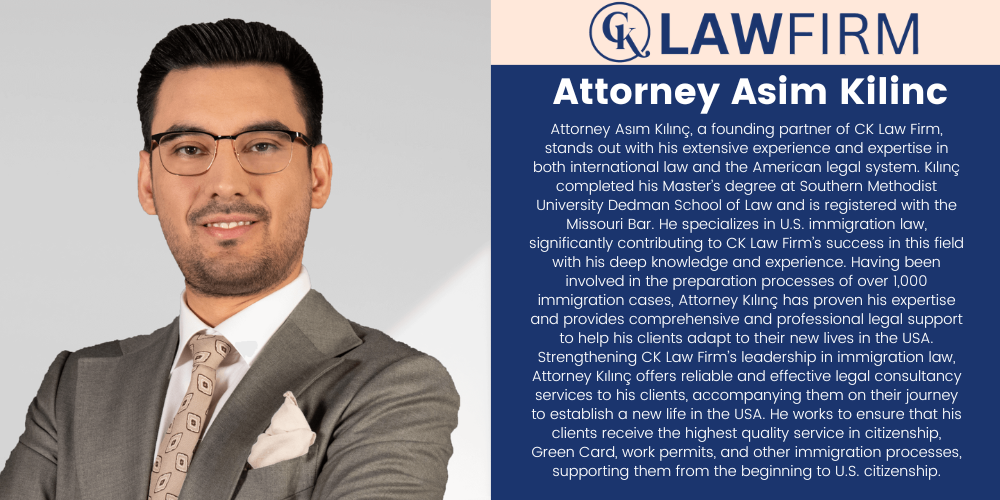
Subscribe to Our Newsletter
Subscribe to our newsletter to stay informed about the latest announcements and articles written by our attorneys on U.S. immigration processes.
Sobre Nosotros
Contáctanos
+1 (945) 527- 23 22
Correo electrónico
info@cklawfirm.org
Dirección
2800 Regal Rd #102, Plano, TX 75075

All Rights Reserved by CK Law Firm.


